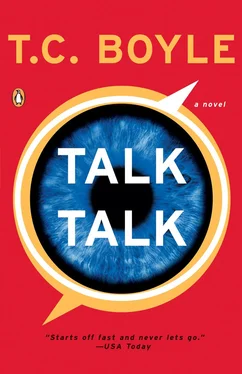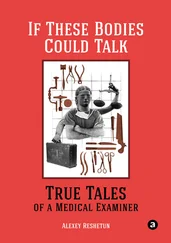“He's got “me” now-somehow he managed to get hold of my identity, taking out credit cards in my name and I don't know what else, and if anybody comes there looking for me, creditors or collection agencies or whatever, I want you to know it's not my fault. I'm not guilty. Don't blame me.”
“Blame? Who is blaming? I want to tell you something, that there is a woman, very young woman, sitting in your workstation right now, a quick worker, bedder, I think, than you-if you are even here, is what I mean.” Bridger tried to cut in, but Radko had raised his voice now, hooking the words on the caps of his teeth and spitting them into the receiver. “But you are not here, are you?”
“I understand. I know where you're coming from. I just want to say that this is all way beyond my control, and, well, I guess when I get back I'll give you a call. Just in case-”
“In case what?”
“You need me. Again.”
“When “do” you come back?”
The voice on the radio flared and died. Dana hadn't moved, even to blink her eyes, everything stationary except the shapes of the distant cars and trucks ever so gradually enlarging on the far side of the divider. “I don't know. As soon as I can.”
“You don't know?” Radko paused for effect. “Then I don't know too,” he said, and cut the connection.
That was Utah. Then there was Wyoming, and after Wyoming, Nebraska and Iowa and the worn green underbelly of Illinois and on and on, the road a whip and the car clinging to it like a drop of sweat or blood or both. They alternated behind the wheel, one of them unconscious in back as the other fought the tedium, and he tried to take most of the burden on himself because it was especially hard on her with conversation a virtual impossibility and no radio to distract or absorb or infuriate her. She wasn't a bad driver-the deaf, as she'd pointed out to him a hundred times, were more visually alert and spatially oriented than the hearing, hence better drivers, hands down-but he couldn't help worrying she'd drift into a trance and do something regrettable, if not fatal. Exhaustion crept up on him, though. And the heat. It seemed as if they were following a heat wave all across the fat wide hips of the country, hardly a cloud in the sky and not a drop of rain.
They stopped one night at a motel in a college town in western Pennsylvania, both of them so keen to escape the torture chamber of the car they no longer cared whether Frank Calabrese got to New York ahead of them or if he'd defrauded another half-dozen people in the interval or set himself up as President and CFO of Halter/Martin Investments. For his part, Bridger was ready to let it go, give it up, repair the damage and move on, but Dana was intractable. “You're like Captain Ahab,” he said, clumsily finger-spelling it for her as they stood in line at a Subway crammed with students slouching under the weight of their backpacks.
“I am not”, she signed.
“You have to know when to cut your losses”-he tried to make a joke of it-“otherwise you wind up with a peg leg, or worse: you go down with the whale. You don't want to go down with the whale, do you?”
She didn't laugh. Didn't even crack a smile. For a moment he wondered if she'd understood him, and he was about to repeat himself, though nothing falls flatter than a joke reiterated, when her eyes went hard. Her shoulders were cocked toward him, her hair fanned out as if a sudden breeze had caught it, and when she spoke her words were stamped with the impress of her teeth: “It's not funny. You're not funny.”
They'd come to the glassed-in counter now, Dana next in line, and the shrunken harried-looking woman in plastic cap and gloves, whose job it was to layer meat, cheese and vegetable matter on the customer's roll of choice, was saying “Next” in vain. “You're not funny.” Jesus, did she have to be so negative all the time? Couldn't she lighten up? Even for five minutes?
Of course, he wasn't in the sunniest of moods himself (they were both wiped, both in need of food, a shower, a couple hours comatose on a king-size bed in front of a pulsating TV screen) and something in him, the first flicker of a cruel impulse he never knew he possessed, made him wait till the woman had raised her voice-“Next!” she cried in exasperation, “Next!”-and finally reached across the counter to poke Dana with her plastic-clad index finger. No one likes to be ignored, that was what he was thinking-that was what he was communicating here, a little lesson, tit for tat-even as Dana gave him a savage look, then turned to the woman and ordered, pointing out the items she wanted because pointing was the norm in this establishment, the whole process of shuffling down the line and creating the sandwich a cooperative pantomime between customer and worker punctuated by the odd verbal cue: “Six-inch or twelve? Balsamic-cheddar whole-grain or regular Italian? To drink?”
He waited till they were back in the motel, shoes off, sunk into the bed under the tutelary eye of the TV and working on the sandwiches, before bringing up the subject again. “I don't know,” he said, looking her in the face. “I just wonder what the plan is, that's all.”
She was at a disadvantage, because it took both hands to compress a twelve-inch submarine sandwich and keep it from disintegrating into its constituent parts, but she was game. She paused to swallow, then leaned over to take a sip of the extra-large diet soft drink clenched between her legs. He saw that her face was relaxed now, the tension and fatigue beginning to loosen their grip. She came up smiling. “The plan,” she said carefully, “is to stay at my mother's and let her spoil us for a few days.” She opened wide, took a foursquare bite of the sandwich, chewed, swallowed, both hands engaged. “Then,” she said, gazing from him to the TV screen and back, “we get in the car, go up the FDR Drive to the Deegan Expressway to I-87 to the Sprain Brook and take that to the Taconic. If memory serves, it's 9A after that and then Route 9 right on into Peterskill.” She bent forward for another bite, a baffle of bread, Swiss cheese and smoked turkey blunting her diction. “It's a scenic route,” she said, chewing, “beautiful trees, dogwood, wildflowers. You're really going to love it.”
It was past noon when they woke, the room frigid and dark, as remote from the world as a space capsule silently drifting across the universe, and they might have slept even later if Bridger hadn't become aware of a muted sound, a rhythmic thumping insinuating itself in the space between the low groan and high wheeze of the air conditioner. At first, he didn't know where he was, everything dim and robbed of color, a sensation of wheels sustaining him, of motion, but then he was fully awake and the noise-someone was knocking at the door, that was it-rousing him to action. He slipped into the pair of shorts he'd flung on the carpet the night before, the feel of them cold against his skin-cold, and faintly damp with yesterday's sweat. The knocking seemed to intensify. He glanced at Dana. Her face was wrapped in sweet oblivion-nothing could wake her, and the thought made him feel tender and protective. What would have happened if he wasn't there? The place could have been on fire and she'd never know. He fumbled his way to the door and pulled it open.
A woman was poised there before him, her fist arrested in the act of knocking-a woman with indignant eyes and her black hair pulled back in a knot, and why did she look so familiar? For a moment, he was mystified, but then he took in her sandals and the tangerine-colored sari, and began to understand. “What?” he said, squinting against the assault of sunlight. “What is it?”
“Checkout time is eleven a. m.,” the woman said.
“Oh, yeah,” he muttered, “yeah, sorry.” The heat, gathered up off the pavement and filtered through every creek, pond and mosquito-infested puddle in the neighborhood, rose up to stab at him till he winced: “humidity.” He'd never really known what it meant except in the abstract. He was sweating already.
Читать дальше












